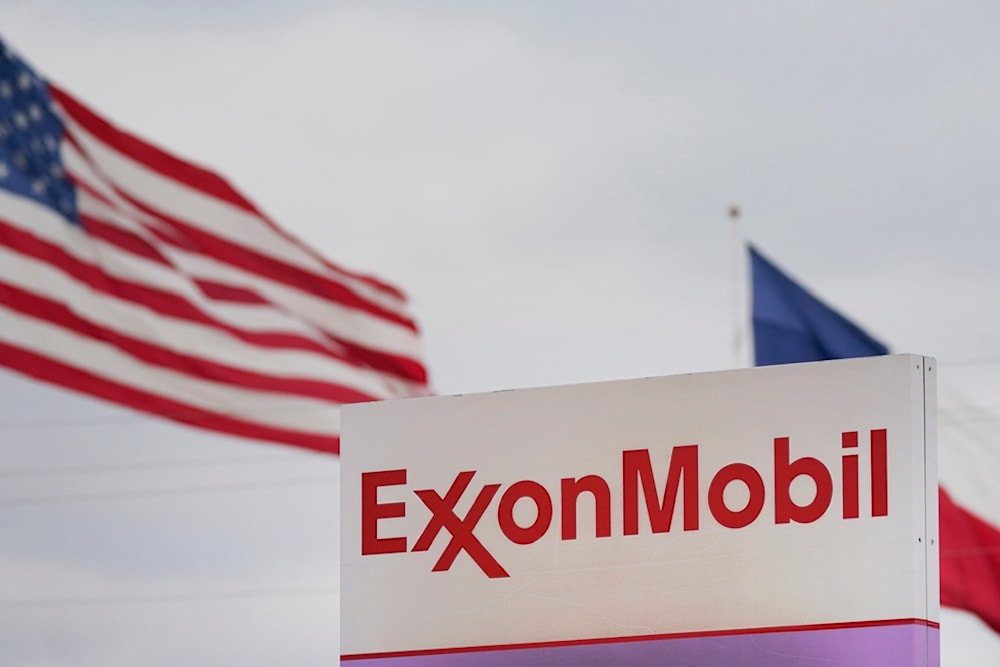Venezuela accuses ExxonMobil oil giant of conspiring against state
According to the Venezuelan interior minister, ExxonMobil funds some Republican lawmakers to push for oil sanctions against Venezuela.
-

An ExxonMobil fuel storage and distribution facility is shown in Irving, Texas, on January 25, 2023 (AP)
American oil company ExxonMobil seeks to take control of Venezuela's natural resources and has therefore funded a lobbying group to persuade the US government to revoke the license allowing Chevron—a multinational American energy company—to operate in the country, Venezuelan Interior Minister Diosdado Cabello revealed.
Cabello said US Republican Congresswoman Maria Elvira Salazar is a partner of Venezuelan opposition leader Maria Corina Machado in managing funds they receive from ExxonMobil.
He said the company finances Machado and all her affiliated media lobbying groups to undermine Chevron and conspire against Venezuela.
The Venezuelan minister added that Machado would negotiate with ExxonMobil over Essequibo, a region that has been administered by Guyana for over a century but is also claimed by Venezuela, on the condition that it funds a military operation using mercenaries in Venezuela.
Cabello also alleged that Erik Prince, the founder of Blackwater, had offered his services to Machado to carry out assassinations in Venezuela.
He emphasized that the Venezuelan government did not force Chevron to enter the country to market oil, asserting that the company came on its own accord and signed agreements in the US and that anyone wishing to come to Venezuela will find the doors open.
According to the Venezuelan Interior Minister, ExxonMobil funds Republican lawmakers Maria Elvira Salazar, Carlos Gimenez, and Mario Diaz-Balart to push for oil sanctions against Venezuela.
He noted that Machado is allegedly planning a march in 21 US states to pressure US President Donald Trump into imposing further sanctions on Venezuela.
Meanwhile, Venezuelan Vice President Delcy Rodriguez recently presented a document highlighting the pressure ExxonMobil exerts on oil license holders in the Bolivarian state, condemning the company's alleged financial backing of lobbying efforts to expel Chevron from Venezuela.
Rodriguez pointed out that the authors of the document are Juan Zarate, Davis Scott, and Peter Williams, recalling that Zarate—known as the "architect of sanctions"—is a Harvard graduate who previously served as US Under Secretary of the Treasury and has close ties to political lobbying networks in the United States.
The US has given energy giant Chevron a 30-day deadline to halt its operations in Venezuela.
Chevron is responsible for producing and exporting nearly a quarter of Venezuela's daily one million barrels of crude, a crucial revenue source for President Nicolas Maduro’s government.
Last week, the US Treasury Department announced that Chevron must cease production within 30 days, a timeframe that industry experts consider unrealistic.
Venezuela’s oil output stands at just over one million barrels per day, with more than 200,000 barrels originating from Chevron's operations and exported to the United States.
Chevron operated in joint ventures with state-owned Petroleos de Venezuela (PDVSA) across four crude oil projects.
The company had been functioning under special permits granted by the US Office of Foreign Assets Control (OFAC) in November 2022, following the US oil embargo imposed on Venezuela in 2019.
In recent weeks, US-Venezuela relations have undergone a sudden shift. Trump initially dispatched envoys to engage with Maduro, only to abruptly reverse course.
Last year, Washington refused to recognize Maduro's re-election, citing widespread disputes over the results.
Trump has also targeted Venezuelan migrants, pressing Caracas to accept the return of hundreds of thousands of deportees from the United States.
Read more: Venezuela to maintain oil production despite US anti-Chevron order

 4 Min Read
4 Min Read








